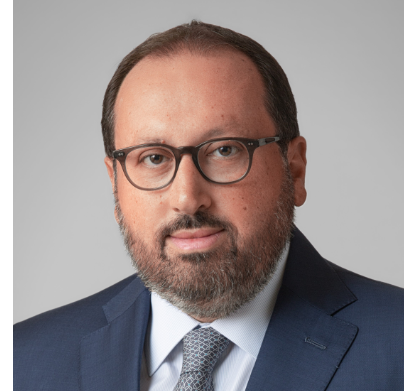DUBAI: Alain Bejjani is in no doubt about the destructive power of the “tsunami” that has swept over the world with the coronavirus pandemic.
The chief executive of Majid Al Futtaim (MAF), one of the biggest and best-known conglomerates in the Middle East, told Arab News: “This is beyond business. This will change how we live on this Earth as human beings in societies. The coming 10 years will be marked by the reverberations of this crisis.”
MAF is at the sharp end of the interface between consumers and business that has been transformed by the pandemic.
Its malls and Carrefour supermarkets provide life-sustaining supplies for millions of people; its Vox cinemas, hotels and other leisure facilities provide the rest and recreation they need in what passed for a “normal” life before the lockdowns.

MAF’s CEO Alain Bejjani. (Supplied)
The malls — 27 of them across the region — have been at the front line, both as a business and as an essential service.
Bejjani pledged early on in the crisis that workers in the Carrefour business would not be laid off, nor have their pay reduced. He also announced a rent freeze for trader tenants in the malls. He is sticking to both commitments.
Staff from locked-down areas such as cinema and leisure businesses have been retrained and redeployed in the supermarket operations, and nobody has been laid off so far for anything other than normal employment issues.
On the pay promises to staff, he said: “They’ve been there for us, and we’re there for them.”
While some bonus payments and travel allowances have not been met in the economic downturn following government lockdowns, basic salary and benefits such as housing and insurance have been, and will be, met for as long as is necessary, he said.
On rents in the malls, he said that these would be suspended as long as malls were closed.
“When people are not trading, we help them. But now that the malls are opening again, we will go back to charging rent,” he said, pointing out that MAF is both landlord and tenant in many of its properties.
While malls were closed, and even when access is being partially restricted under newly relaxed guidelines in Saudi Arabia, the UAE and Egypt, there has been a dramatic increase in e-commerce across all of MAF’s operations.
UAE online business has risen 300 percent over the past year, most of that in the last quarter, while Egypt is up 735 percent. MAF’s online business in Saudi Arabia is up a staggering 1,400 percent, year on year.
“We think this business will continue to be there,” Bejjani said, pointing to the Online Marketplace launched recently in the UAE.
Carrefour’s online business, notably from the gigantic store in the Mall of the Emirates, had some early problems fulfilling orders and delivering produce in the last mile, but Bejjani said these have been resolved by upgrading capabilities and more efficient use of technology.
In Saudi Arabia, new fulfillment centers have been opened, and delivery problems in curfew conditions ironed out.
“There was a surge in demand, and we had to adapt to it as fast as possible,” he said.
There has been little panic-buying along the lines of many stores in Europe and elsewhere, and MAF’s policy of holding a three-month stockpile in reserve is helping to keep supply lines open, even if a rise in airfreight costs risks causing higher prices at some stage.
“Governments are aware of that risk,” Bejjani said.
Malls in the Middle East are more than just shopping venues, however, and a good deal of social and recreational activity has been effectively put on hold by the pandemic, with cinemas, restaurants and other forms of entertainment — such as the big indoor ski runs in Dubai and Cairo — closed for the past month.

Inside Vox Cinema at Riyadh Front. (Supplied)
Restrictions on food and beverage outlets have been at least partly relaxed as the malls have reopened, with appropriate social distancing and protective wear requirements. But the cinemas remain closed, which is something Bejjani feels strongly about.
 “I think cinemas are less risky than restaurants, for example, with lower levels of interaction between people. I don’t see why governments that are allowing malls, stores and restaurants don’t allow cinemas.
“I think cinemas are less risky than restaurants, for example, with lower levels of interaction between people. I don’t see why governments that are allowing malls, stores and restaurants don’t allow cinemas.
“I’d advocate reopening them, with the right measures like social distancing, protective wear and frequent sanitizing. Governments are doing a lot to support the economy, jobs and payrolls — why not just let people work where they can?” he asked.
MAF has led the way in the entertainment revolution in Saudi Arabia after cinemas were legalized two years ago, and Bejjani said that the group remained committed to the target of opening a total of 600 Vox screens in the Kingdom to eventually become its biggest movie operator.
“From a timetable point of view, that might be affected by the closures and project delays because of the pandemic,” he warned.
The crisis has affected the movie business in other ways too.
The big studios in Hollywood and elsewhere have put back the release of blockbuster films until the end of the year at the earliest.
Cinema-goers have become more accustomed during the lockdowns to television entertainment at home, streaming movies and series from the likes of Netflix and others.
Does Bejjani think that will be a permanent trend when the restrictions are lifted?
“The pandemic will accelerate trends, and expose strengths as well as weaknesses.
“There will be more streaming at home, I’m sure, so cinemas will have to be even more experience based.

Cinema-goers have become more accustomed during the lockdowns to television entertainment at home, streaming movies and series from the likes of Netflix and others. (Supplied)
“We’re already well advanced with our Dreamscape Immersive virtual reality venture, and we’re working on other things for later this year.
“We’re evolving our entertainment business into something that can accommodate customers wherever they are, at home or wherever,” he said.
Amid the global debate about when to fully open up economies and when businesses such as MAF will get back to some post-coronavirus normality, Bejjani takes a long-term and philosophical view.
“There will be a post-COVID-19 world, but it is still in the making. The response of governments will shape the behavior of consumers going forward. But it has to be based on science and medicine,” he said.
“I think the new post-pandemic world will be here when we have all had a vaccine shot and we all feel safe again.
“We will have an idea of how it will be for businesses like ours in six to nine months after we’ve had to vaccine. It could take two years or more from now to come back to a new normal.
“MAF is committed to sustainability, and a sustainable business must be able to withstand more than a month or two, or even a year, of crisis.
“The litmus test for us is if the business can go through a storm of bad weather and keep itself afloat.
“And this is more than just bad weather — this is a tsunami.”









































